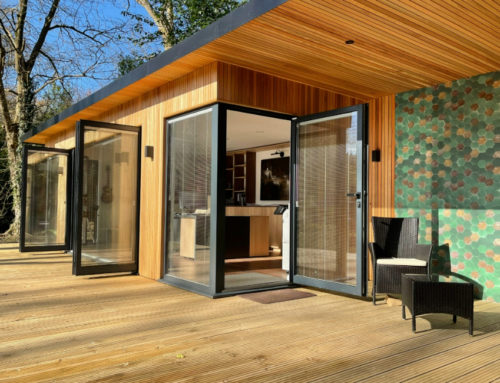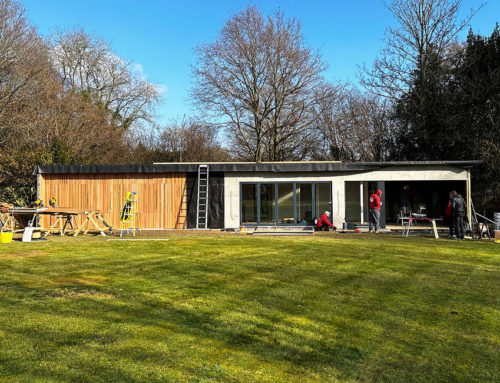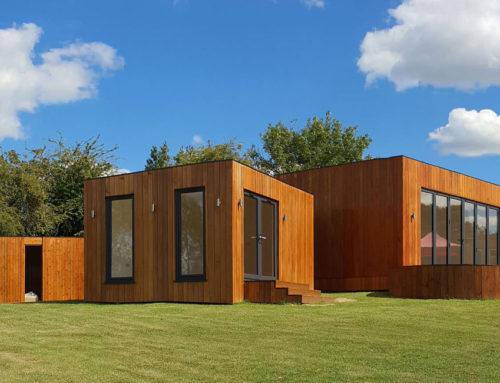When it comes to expanding your property with an annexe, one of the primary concerns that often arises is the need for planning permission. Many homeowners are unaware that there is a legal route that allows you to build an annexe without going through the time-consuming and sometimes challenging planning permission process. The key lies in utilizing The Caravan Act as your legal vehicle and transforming your annexe into a mobile home.

Large mobile home based in the Brighton area for a mum and her child, built without planning permission. This structure includes three bedrooms, one bathroom, and a large open-plan kitchen and living room area. Built by A ROOM IN THE GARDEN in 2022.
Understanding the Planning Permission Conundrum
Traditionally, adding an annexe to your property can be a complex endeavour. Local authorities often require meticulous planning applications, thorough assessments, and adherence to zoning regulations. This can lead to significant delays, uncertainties, and even refusals, especially in areas with strict planning restrictions, protected landscapes, or Areas of Outstanding Natural Beauty.
The Caravan Act: A Game-Changing Solution
Enter The Caravan Act, a legal framework that provides a streamlined path to constructing an annexe without planning permission. This is achieved by designating your annexe as a mobile home, thereby circumventing many of the planning hurdles.
Here’s how it works:
- Legal Status as a Mobile Home: By structuring your annexe according to the specifications outlined in The Caravan Act, it can be considered a mobile home under the law. This entails certain design and size parameters, but it offers the significant advantage of not requiring planning permission.
- VAT Benefit: Mobile homes built in accordance with The Caravan Act enjoy a 0% VAT rate, provided they include both a bathroom and a kitchen. This can result in substantial cost savings compared to traditional annexes, which are subject to a 20% VAT rate.
- Flexibility: Mobile homes can be installed in a wide range of locations, including protected areas and places where obtaining planning permission would be exceptionally challenging.
- Building Control: Unlike conventional annexes, mobile homes constructed under The Caravan Act generally do not require the same level of building control oversight, simplifying the construction process.

A bespoke mobile home with one bedroom, one bathroom, and a spacious kitchen and living room area. This building includes custom-built cabinetry, walk-in wardrobes and sliding doors. This mobile home was built by A ROOM IN THE GARDEN in 2023 with no planning permission needed.
Key Differences and Considerations
Here’s a summary of the key differences between building an annexe with planning permission and utilizing The Caravan Act for a mobile home annexe:
- Planning Permission: Traditional annexes require planning permission, while mobile homes under The Caravan Act do not.
- VAT Rates: Annexes are subject to a 20% VAT rate, whereas mobile homes enjoy a 0% VAT rate when they include both a bathroom and a kitchen.
- Building Control: Traditional annexes often require building control compliance, whereas mobile homes may have reduced building control requirements.
- Size and Location: Traditional annexes’ size and location are determined by the planning application, whereas mobile homes can be installed in various locations and have specific size parameters under The Caravan Act.

Uniquely shaped garden annexe in Chester, featuring an open-plan kitchen and living room area, a bedroom and ensuite bathroom. This home was built by A ROOM IN THE GARDEN in 2023 with no planning permission.
Conclusion: A Convenient Path to Your Annexe
In conclusion, if you’ve been wondering, “Can I build an annexe without planning permission?” the answer is yes, by utilizing The Caravan Act to create a mobile home annexe. This legal avenue not only simplifies the construction process but also offers financial benefits through a lower VAT rate and greater flexibility in choosing your annexe’s location.
To navigate this process effectively and ensure compliance with the law, talk to A Room in the Garden, experts experienced in mobile home construction and The Caravan Act. With the right guidance, you can turn your annexe dream into a reality, without the hassles of planning permission.



